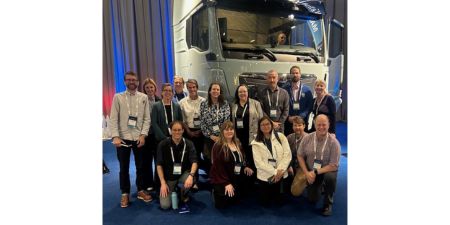
The CREATE International Faculty Delegation immersed itself in Day Two of the Nordic EV Summit at NOVA Spektrum, Lillestrøm, Norway. Organized by the Norwegian EV Association, this globally renowned event—now in its ninth year—convened over 700 delegates to advance electric mobility. The summit’s focus on innovation, policy, and collaboration aligned perfectly with CREATE’s mission to drive energy education research and innovation for the workforce.
The day began with a networking breakfast, where faculty mingled with industry pioneers, from battery developers to policymakers. The exhibition hall showcased cutting-edge EV solutions, including ultra-fast chargers and sustainable battery recycling systems, sparking ideas for classroom integration and research partnerships.
The Day 2 Opening Session, themed “Global Trade Wars and the EV Market,” featured Drew Kodjak reflecting on Dieselgate’s legacy, Jane Akumu detailing Africa’s EV strides, and Thomas Seltzer analyzing U.S. green policy divides. Moderated by Monica Araya, with hosts Ellen Hiep and Lars Lund Godbolt, the panel, including Mattias Goldmann, explored strategies to bolster EV markets globally. These discussions prompted our delegation to consider how trade policies and cultural factors shape electrification, enriching their teaching frameworks.
Our eyes were opened by the presentation of Hui Zhang in the session titled “Breaking Boundaries in EV Mobility”. Zhang featured the battery swap technology pioneered by the Chinese EV manufacturer Nio. Nio cars travelling on long distance trips can visit a battery replacement “fueling” station. Autopilot systems guide the EV vehicle into a service bay, and swap out the discharged battery with a new fully charged unit – in less than three minutes – so that the driver can continue on their journey. To date, Nio has completed over 7 million battery swaps, and several other Chinese manufacturers have since introduced competing EV models using similar battery exchange platforms. This session illustrated the type of rapid technological innovation happening in the EV sector, and underscored the challenges facing legacy internal combustion car manufacturers, with implications for American economic competitiveness.
The PwC Partner Stage during lunch highlighted heavy-duty fleet electrification, spurring discussions on scalable transport solutions. One fast emerging EV application is the use of heavy duty electric trucks to move goods from the Port of Oslo to distribution centers located on the outskirts of the city. In this way, short haul EV trucks provide emissions free transport in the city center, shouldering the first 60 km of travel, and greatly improving urban air quality. Then at the outlying distribution centers, trailered loads are transferred to diesel fueled long haul trucks to deliver the goods to towns and customers in Norway’s more distant rural areas. By deploying this strategy, short range EV trucks are able to achieve the majority of the desired environmental benefits, even while contributing only a portion of the total transport mileage. CREATE participants observed that there was considerable potential for a similar strategy to be implemented on the West Coast of the United States, where short haul EV trucks operating out of Pacific Ocean ports could provide much needed relief from persistent urban air pollution in California cities.
A standout Deep Dive session, “Achieving the Tesla Charging Experience for All EV Owners,” delved into Plug & Charge and Autocharge technologies. Market research has documented the infrastructure challenges and charging frustrations experienced by some EV drivers, and have also quantified the superior customer satisfaction delivered by the Tesla charging ecosystem. Experts like Adriana Fricke and Erik Lorentzen emphasized the value of Tesla’s seamless charging platform, and pointed to the importance of future “smart” transactional systems being able to digitally recognize vehicle VIN numbers without driver’s having to enter PIN numbers or swipe IDs or credit cards. This inspired CREATE faculty to explore how infrastructure access, consumer preferences, and driver behavior might influence the growth of regional American EV markets.
With Oslo boasting 94% electric new car sales, the summit underscored Norway’s leadership in EV adoption. The CREATE delegation left energized, equipped with insights to enhance energy curricula. Day Two reinforced the summit’s role as a catalyst for innovation. It was a great culmination to our trip, leaving the faculty eager to translate these experiences into actionable educational and research initiatives.
Sign up for the CREATE Newsletter and stay updated on the latest information in Renewable Energy Education.
Copyright @ 2025 CREATE National Energy Center
This material is based upon work supported by the National Science Foundation under Grant #2201631. Any opinions, findings, and conclusions or recommendations expressed in this material are those of the author(s) and do not necessarily reflect the views of the National ScienceFoundation.